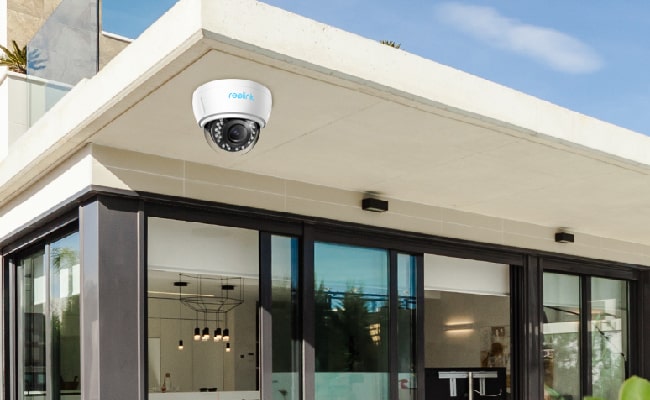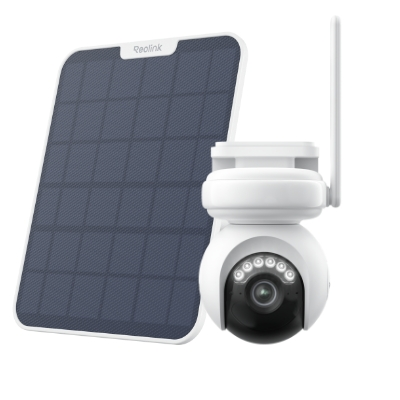Laws on Outdoor Surveillance Cameras for Home: Legal Insights

Installing outdoor surveillance cameras at home for security purposes is becoming increasingly common. However, there are laws and regulations regarding camera placement that homeowners should be aware of. We examine laws on outdoor surveillance cameras for homes, residential security cameras laws, and security camera laws like audio vs. video recording policies. Keep Reading!
- Federal Laws on Outdoor Surveillance Cameras for Home Security
- Security Camera Placement Laws by State
- Importance of Obeying Residential Security Cameras Laws
- Where to Point Outdoor Surveillance Cameras?
- Restricted Locations for Security Cameras by Law
- Audio Recording vs. Video Recording in Laws: What's the Difference?
- Bonus: Laws against Hidden Cameras
- FAQs
- Conclusion
Federal Laws on Outdoor Surveillance Cameras for Home Security
Regarding outdoor home surveillance cameras, there are no residential security cameras laws in the United States restricting use on private property. Generally, homeowners can install and operate security cameras overlooking their land.
However, federal wiretapping laws come into play when audio recording is involved. The Federal Wiretap Act prohibits intercepting or recording oral communications without consent from all parties. Security cameras with audio functions could violate this if installed in inappropriate areas without proper signage notifying those potentially registered.
The Fourth Amendment also protects against unwarranted government searches of private property. Police must have cause and warrants to demand footage from privately owned home surveillance systems. But, it does not apply to laws on surveillance cameras in public places.
Security Camera Placement Laws by State
While federal statutes provide a broad framework, states have their specific regulations regarding security camera laws. Here are the video surveillance laws by state:
- California - California security camera laws are among the strictest, requiring consent from those recorded in any private setting. Public areas are fair game.
- Florida – Video recording is allowed in all public places, business areas, and any private property belonging to the camera owner. But consent is needed for audio recording.
- Illinois – Surveillance laws center around audio recording, which is prohibited without consent from all recorded parties. Video is unrestricted on one's premises.
- Maryland - Video recording is permitted on private property, provided there's no sound recording without consent. Public spaces have no major restrictions.
- Massachusetts - Strict consent requirements apply here for any audio recording. Video recording itself has little restrictions on private property.
- New York - Generally allows surveillance cameras on private premises, but audio recording consent laws still apply in private domains.
- Texas - Video monitoring is lawful on private premises. Audio recording is also permitted, given there's appropriate notification signage.
- Washington - Video recording laws allow systems to cover the perimeter of private property. Audio recording mandates all-party consent.
These examples illustrate audio consent requirements in many states. Always check specific municipal statutes for your locality's latest video surveillance regulations.
Importance of Obeying Residential Security Cameras Laws
Adhering to both federal and your state's video surveillance laws is critical for several reasons:
Privacy Protection
Respecting others’ privacy should be your first consideration when installing outdoor security cameras. Illegal surveillance infringes on privacy rights protected by law in many jurisdictions.
Legal Compliance
Violating audio and video recording statutes can result in lawsuits or criminal charges in some states. Prevent legal problems by researching and complying with surveillance regulations.
Trust Maintenance
Following security camera laws preserves trust between neighbors. Illegally spying on those around you destroys community relationships quickly. It is a violation of residential security camera laws.
Enhanced Security
When home surveillance systems are installed correctly in legal locations, they provide homeowners with vital security enhancements without controversy.
Where to Point Outdoor Surveillance Cameras?
When positioning your outdoor surveillance cameras, ensure they only capture footage of areas you own or control. This includes:
- Your front door area and entryways.
- Perimeter fence lines or property boundaries.
- Driveways, decks, patios, garages, or yards belonging to your premises.
- Common spaces if in multi-family housing.
Industry-leading 4K Continuous Recording Battery Camera
4K UHD Continuous Recording; ColorX Night Vision; Pan & Tilt; Automatic Tracking; All Recordings Stored Locally.
Do NOT point cameras to intentionally record any neighbors' or public spaces beyond your land. Doing so likely breaches privacy statutes. Likewise, be cautious of unintended overcapture from wide-angled systems. Adjust the field of view or use privacy controls like masking to avoid illegally tapping adjacent homes or lands.
Restricted Locations for Security Cameras by Law
Certain areas are legally off-limits for security camera placement as they violate reasonable privacy expectations. These include:
Bathrooms
Are cameras allowed in bathrooms? No, they are not. Expectation of privacy is at its highest in private bathrooms, and installing cameras there risks criminal charges in some states.
Neighbor's Property
Can my neighbor record my backyard? No, your neighbor can't. Pointing cameras directly at neighbors' windows or backyard areas infringes on their privacy. Reorient any outdoor systems only to cover your premises. So, can my neighbor record me on my property? No, he can't.
Bedrooms
Secretly recording private bedrooms in rental units or shared homes can breach consent requirements and be deemed harassment.
Restrooms
Public or employee restrooms have a reasonable privacy expectation under the law. Avoid installations there without explicit authorization.
Note: Most areas where privacy is reasonably expected have restrictions against video recording without appropriate consent or notification—position outdoor systems only to cover your entryways, perimeter, or property.
Audio Recording vs. Video Recording in Laws: What's the Difference?
Many state statutes treat video and audio surveillance laws differently in terms of consent and privacy:
- Audio recording laws are generally stricter, requiring permission from all parties being intercepted in private conversations.
- Video recording policies mainly govern "reasonable expectations of privacy" in private places. Public areas have far fewer restrictions.
- Hidden "nanny cams" with integrated microphones in private rooms likely violate wiretapping laws in most states.
- Likewise, loud altercations with neighbors captured by a security camera's microphone can breach consent requirements in some areas.
- Public areas like yards and driveways have fewer expectations of audio privacy in many locales. However, regulations still vary significantly by state.
Consult a lawyer if you need help determining whether your outdoor camera setup breaches video surveillance on private property where you live. Both aspects may require different treatment under your local laws.
Bonus: Laws against Hidden Cameras
Most US states have laws expressly prohibiting the secret installation of spy cameras or eavesdropping devices on private premises. These fall under legal definitions of criminal "Peeping Tom" behavior, trespass, stalking, harassment, or invasion of privacy.
Penalties for hidden cameras discovered secretly taping private activities range from lawsuits to fines to imprisonment, depending on the state and circumstances. Victims also have a right to demand footage deletion without their consent.
The key exceptions relate to consumer spyware sold as "nanny cams" or home surveillance systems provided:
- Appropriate signage discloses recording is occurring.
- Devices are installed only in common rather than private rooms.
- Audio recording features abide by all-party consent requirements.
In summary, laws against hidden cameras in most states expressly forbid secretly planting cameras or bugs to spy on private moments without permission. If you are still wondering if hidden cameras are illegal, you must know they are not.
FAQs
What is considered illegal surveillance?
It was installing any cameras or recording devices to intentionally peer into private bedroom spaces, bathrooms, dressing areas, backyards, or adjacent homes with a reasonable expectation of privacy without consent from those being observed.
Are hidden cameras illegal?
Generally, yes - hidden spy cameras placed in private spaces without appropriate consent violate most state laws. However, if appropriately disclosed, nanny cams and home security setups may qualify as legal.
What can I do if my neighbor has cameras recording me?
First, politely ask them to stop the invasion of privacy and reposition the equipment. If this fails, send formal notice making clear the filming is non-consensual. Finally, consulting an attorney may be necessary to compel removal via legal pressure based on privacy laws.
How to block neighbor security camera?
Start by politely discussing your concerns with your neighbor, as they might not be aware of the issue. If this doesn't resolve the problem, consider installing privacy screens, fences, or tall plants to block the camera's view. Using blinds or curtains indoors can also help protect your privacy.
Additionally, you can enhance your own security by installing cameras or motion-activated lights to deter the unwanted surveillance. Check local laws regarding surveillance and privacy, and if necessary, consult with an attorney to understand your rights and potential legal remedies.
Is it illegal to have cameras around your house?
Security cameras are permitted on your own property. However, it is illegal to record individuals without their consent in areas where there is a reasonable expectation of privacy, such as bathrooms, changing rooms, private bedrooms, and similar locations.
Conclusion
Member to always inform yourself about federal and state laws regarding surveillance camera installation. Respecting privacy rights, legal compliance, and maintaining trust within your community are essential factors to consider when installing outdoor surveillance cameras. By understanding and obeying the laws on outdoor surveillance cameras for home, you can enhance your home security while respecting the privacy and rights of those around you.
- Legality and Reasons of Landlords Putting Security Cameras in Rental Property
- Neighbour has Camera Pointed at My House, How to Do?
- Is It Legal to Post Security Camera Footage Online?
- Alternatives to Hidden Home Security Cameras
- Can Tenants Install Security Cameras (Systems) Inside or Outside the Apartments
Search
Be in the Know
Security insights & offers right into your inbox

